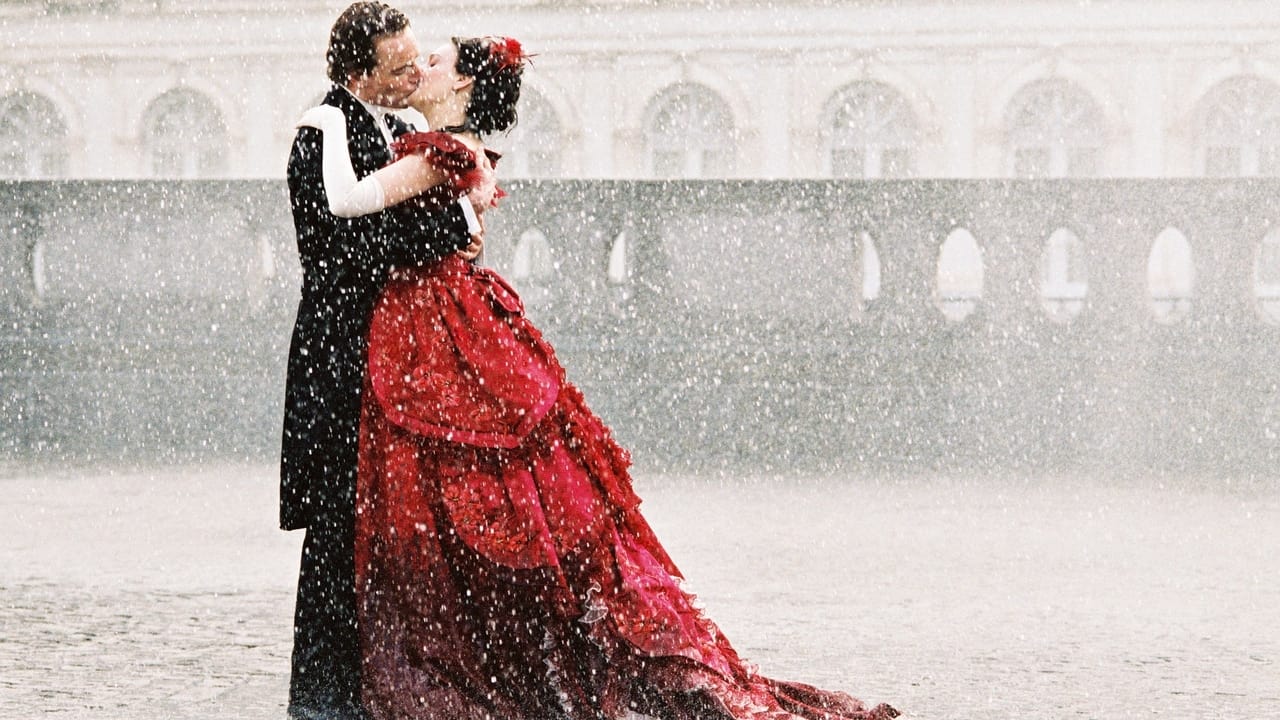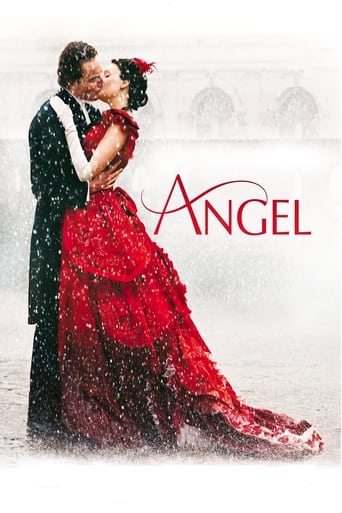

Hungary's gift to world cinema via Hong Kong (her birthplace), the amazing Romola Garai, here really pulls off the impossible, aided by the deft and sure-footed Francois Ozon as director. Here she gives a performance so impressive that she actually saves a bodice-ripper of a romantic novel by Elizabeth Taylor but becoming a travesty, and turns it instead into a classic. This is one of those daring film projects which one would have thought had no chance of success at all. It is done with tongue just enough in cheek not to take itself too seriously, but because of the intensity of Garai's central performance as the over-the-top character Angel Deverell, and the earnestness of her great big eyes as she does it, the impossible happens, and the film works! Really, the result is astonishing! The sombre, toned-down performance of good old Sam Neill also helps, because he is so under-the-top that he quite compensates for Angel Deverell's wild and extravagant excesses as a character. A bemused Charlotte Rampling oozes suitable resentment as Neill's wife, and her narrowed eyes are used to as good effect as ever as she studies Deverell in the way that one would watch a snake glide across the terrace. (Or is it Rampling who is the snake gliding across the terrace? One is never sure with her, especially when she is peering from under those lids and being dangerously subdued, as if coiling to strike.) Francois Ozon is best known for SWIMMING POOL (2003), in which Rampling did one of her many excellings (she has been winning the gold star for a long time now). Ozon seems to have paranormal relations with outstanding examples of the feminine psyche, and without the combination here of Garai and Ozon, this film would have been one of the greatest flops of our time. Garai must have had to have this most caressing of directors looking approvingly at her every time she did one of her wild scenes, so that she could be sure from the feedback that she had not disgraced herself by over-acting. I just don't know how they pulled it off. The way Garai opens her eyes with that innocent stare, wider, wider, Ozon could be considered a kind of dentist: 'Open wide! Now wider! No, wider! Wider!' And it works. The film is consciously a parody of the traditional English romantic novel (you know those dreamy things which women read furtively, in the way that men look at porn magazines, both concealing these vices from each other, since all women secretly believe in true love just as all men think mostly with their organs, and each is ashamed to admit the truth to the other sex). In England these novels are called 'Mills & Boon novels', after the publisher which published so many of them; no man I know of has ever read one. Well, this story is set in Victorian England and is about a precocious 18 year-old girl (Garai, who although 25 at the time looks genuinely 18) who lives above a grocery store and refuses to accept reality in its present form, so to counteract her grim life she writes an early 'Mills & Boon' type novel. It is accepted for publication by Sam Neill and she goes on cranking out these corny books in endless profusion and becomes immensely popular and very rich. She buys the country house she admired from afar when younger, which is (you here have to remember that the cheek is suddenly full of lots of tongue) 'Paradise'. Here the director was very clever and used a real house called Tyntesfield near Bristol in the west of England, and the result is simply breathtaking. The art direction of this film is absolutely spectacular. How much fun they all had doing this! The character played by Garai is an insufferably egotistical self-delusionist on the grand scale, and normally one encounters this kind of role only with much older actresses, as for instance Gloria Swanson in SUNSET BOULEVARD (1950), as a classic example of the type. It is quite a switch to see a young girl play a character who is even more delusional, insane, and self-obsessed than Tony Blair, and every bit as ruthless. Such parts just don't come along for young actresses, whose opportunities to be demented are generally restricted to the more conventional sex sirens, nymphets, or other characters relying entirely on their sexuality. Here sex doesn't come into it, it is all romantic mania carried to the highest possible levels of intensity and, frankly, insanity. This actually makes a refreshing change, since women do have other qualities than desirability, though those of us who find all women intoxicating often have to slap ourselves to stop being so distracted by all those alluring qualities they have and remember that even more interesting than their irresistability is their MYSTERY. Women are a parallel universe, without whom there would be no Universe at all. We men who admire them can only stare in wonder, uncomprehending, at the miracle of femininity. We have such a good example of it here, so provocatively put before us in the context of a frothy romantic confection which gently makes fun of itself as it goes along, that the film might be called more of a witty homage than anything serious. And with that Gallic lightness of touch which the French so often bring to things like this, even when made in English as ANGEL is, the result is a film which could not be more of a delight. Sour-natured people, or those with no sense of humour, should look away now, to avoid being affronted by scenes of dangerous levity.
... View MoreNow I must admit I've not read the book, but I cannot believe that it can be this bad. The dialogue is awful. At the beginning of the film the lead (totally out of her depth) speaks like a 21st century adolescent. What child in Victorian times would have spoken to her mother like she did, stomped off, slammed her bedroom door and not come down to dinner? I was amazed that she didn't switch on her I-Pod. A totally unsympathetic character - gauche is probably a compliment. And the literature she was supposed to be producing? Gothic rubbish (see Jane Austen's Northanger Abbey for a put down of this tripe)? The outcome of the relationship with her husband was totally predictable - oh, how ironic at the end! What a waste of Sam Neill and one of my favourite actresses, Charlotte Rampling. Tyntesfield looked good though - mind you, in these days of 'global warming' we don't get snow in Wraxall anymore.
... View MoreIn "Huit Femmes" Ozon had already displayed his penchant for Douglas Sirk.The deer in the snow was borrowed from "All that Heaven allows" .It is not surprising he has tackled pure melodrama as he claims Sirk's as well as Minnelli's influence.But that was then and this is now:like the thriller which has undergone some changes since Hitchcock or the sci-fi flick which has never been the same after "2001" ,you cannot conceive a melodrama like those respectable directors of the fifties used to do. "Far from Heaven" was ,for instance,what melodrama should be nowadays:while leaning on the Sirkesque tradition,it nonetheless turned its back on the reactionary side which was latent in such works as "imitation of life" and it made the heroine a soon-to-be civil rights activist.Ozon registered the same desire but it's too little : his heroine,a working class girl who hit the big time with her novels read by the populace tries to react against the war ("blinded by blood" ) but this is short-lived ;there's also the homosexual-side-you-find-in-every-film-Ozon-has-made .Here he suggests lesbian tendencies between Angel and her sister-in-law but it's only skimmed over.WW1 does not seem to be that much a serious subject in the movie.When he made a melodrama about WW2 ,Sirk seemed much more concerned ("A time to love and a time to die"),arguably because he knew what war was .It's the supporting cast who walks away with the honors: the always reliable Charlotte Rampling and Sam Neill.The main character is not particularly endearing in her "paradise" .The cinematography ,with golden and red colors ,is dazzling and tries to imitate the Merchant/Ivory productions.A lot of pounds were obviously spent but Ozon's first works ("Sitcom" "Les Amants Criminels" ) with their low budgets were much more absorbing.
... View MoreHmmmm... if the reviews and comments I've seen are any indication, melodrama is as divisive as ever. I found Ozon's approach admirable: intelligent and objective but not satirically distanced, like Fassbinder without the cruelty. It seems clear to me that he is showing us not a realistic depiction of Angel's life but a version colored by her imagination. The intention is not to mock her but to allow us to share her experience, and to make up our own minds about the value of her fantasies. The closest to an authorial statement comes from the character least sympathetic to Angel: Charlotte Rampling as the publisher's wife comments that in spite of Angel's lack of talent or self-knowledge, she has to admire her drive to succeed. Of course we're not compelled to agree, but it strikes me as a fair assessment.The reactions to this movie remind me of the uncomprehending dismissal of Sofia Coppola's Marie Antoinette, another story of a shallow, self-involved woman that insists on looking through her eyes. This kind of scrupulous generosity is in line with a tradition going back to Flaubert's Madame Bovary, and both directors have the stylistic confidence to carry it off. It may just be that they don't have the critics they deserve.
... View More